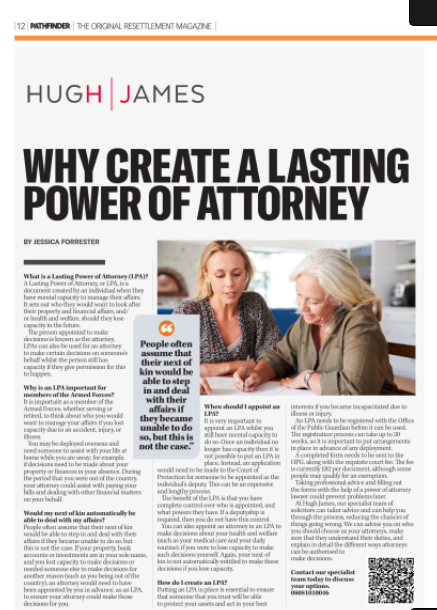Article written by Jessica Forrester of Hugh James for Pathfinder International magazine.

What is a Lasting Power of Attorney (LPA)?
A Lasting Power of Attorney, or LPA, is a document created by an individual when they have mental capacity to manage their affairs. It sets out who they would want to look after their property and financial affairs, and/or health and welfare, should they lose capacity in the future.
The person appointed to make decisions is known as the attorney. LPAs can also be used for an attorney to make certain decisions on someone’s behalf whilst the person still has capacity if they give permission for this to happen.
Why is an LPA important for members of the Armed Forces?
It is important as a member of the Armed Forces, whether serving or retired, to think about who you would want to manage your affairs if you lost capacity due to an accident, injury, or illness.
You may be deployed overseas and need someone to assist with your life at home while you are away; for example, if decisions need to be made about your property or finances in your absence. During the period that you were out of the country, your attorney could assist with paying your bills and dealing with other financial matters on your behalf.
Would my next of kin automatically be able to deal with my affairs?
People often assume that their next of kin would be able to step in and deal with their affairs if they became unable to do so, but this is not the case. If your property, bank accounts or investments are in your sole name, and you lost capacity to make decisions or needed someone else to make decisions for another reason (such as you being out of the country), an attorney would need to have been appointed by you in advance, as an LPA, to ensure your attorney could make those decisions for you.
When should I appoint an LPA?
It is very important to appoint an LPA whilst you still have mental capacity to do so. Once an individual no longer has capacity then it is not possible to put an LPA in place. Instead, an application would need to be made to the Court of Protection for someone to be appointed as the individual’s deputy. This can be an expensive and lengthy process.
The benefit of the LPA is that you have complete control over who is appointed, and what powers they have. If a deputyship is required, then you do not have this control.
You can also appoint an attorney in an LPA to make decisions about your health and welfare (such as your medical care and your daily routine), if you were to lose capacity to make such decisions yourself. Again, your next of kin is not automatically entitled to make these decisions if you lose capacity.
How do I create an LPA?
Putting an LPA in place is essential to ensure that someone that you trust will be able to protect your assets and act in your best interests if you became incapacitated due to illness or injury.
An LPA needs to be registered with the Office of the Public Guardian before it can be used. The registration process can take up to 20 weeks, so it is important to put arrangements in place in advance of any deployment.
A completed form needs to be sent to the OPG, along with the requisite court fee. The fee is currently £82 per document, although some people may qualify for an exemption.
Taking professional advice and filling out the forms with the help of a power of attorney lawyer could prevent problems later.
At Hugh James, our specialist team of solicitors can tailor advice and can help you through the process, reducing the chances of things going wrong. We can advise you on who you should choose as your attorneys, make sure that they understand their duties, and explain in detail the different ways attorneys can be authorised to make decisions.
Contact our specialist team today to discuss your options here!
Hugh James writes monthly advice columns for Pathfinder International magazine.